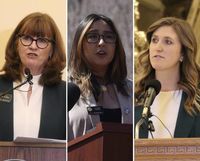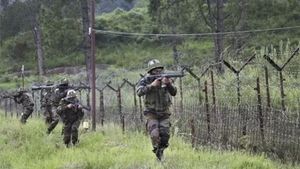DENVER — Colorado is on the brink of enacting some of the most stringent gun control laws in the United States, with lawmakers poised to pass a measure that would outlaw the use of detachable ammunition magazines starting in 2026. This legislation, which has sparked significant debate, aims to address the state’s troubling history of mass shootings, including the infamous Columbine High School tragedy in 1999 and the Aurora theater shooting in 2012.
The proposed law would make it illegal to buy, sell, or manufacture a wide range of firearms that utilize detachable magazines, devices that allow shooters to quickly reload their weapons. Supporters of the bill argue that limiting access to these magazines is crucial in reducing the potential damage inflicted during mass shootings. Tom Sullivan, a Democratic state senator whose son, Alex, was killed in the Aurora shooting, emphasized the need for such measures. “If Alex had had two seconds, maybe he could have gotten behind the seat, maybe something else could have happened in front of him. Maybe he’d still be here today,” Sullivan said.
Despite previous attempts to curb gun violence, including a law passed over a decade ago that banned magazines holding more than fifteen rounds, Colorado has continued to witness significant shootings, including incidents at a Boulder supermarket in 2021 and at Club Q, an LGBTQ-plus nightclub in Colorado Springs, in 2022. These events have intensified calls for more robust regulations.
The new legislation would require that magazines be soldered, welded, or affixed to firearms using strong epoxy, making it much more challenging for gun owners to modify their weapons. While most Democrats in the Colorado legislature support the measure, they have made several concessions to secure the backing of Democratic Governor Jared Polis. One such compromise exempts a number of firearms commonly used for hunting, while another allows individuals to purchase otherwise prohibited guns if they complete up to twelve hours of safety training and obtain special permits approved by local sheriffs.
“This is for the next purchase, and this is for the next person who becomes disgruntled at work or is being led down a path by some ideology out there,” Sullivan explained. “When that person goes down to their local gun shop or big box store, they are going to buy something that’s got an attached magazine to it.”
Daniel Webster, a gun law expert at Johns Hopkins University, indicated that Colorado’s proposed regulations could set a precedent for other states. “Colorado could be really a pioneer in true safety tests for civilian firearm owners,” Webster stated. He acknowledged that the legislation reflects a willingness to balance Second Amendment rights with public safety concerns.
However, the bill has faced fierce opposition from gun dealers and advocates. Brian Clark, owner of Bristlecone Shooting, Training and Retail Center in Lakewood, Colorado, expressed frustration, stating, “The last three to four years, we feel like we’ve been under attack. The Colorado legislature has definitely been chipping away at our rights and our ability to make a living.” Clark warned that the legislation could render 60 to 75% of his long gun inventory illegal overnight, particularly affecting popular models like the AR-15.
Opponents of the bill, including Republican lawmakers, argue that it infringes on Second Amendment rights and could lead to increased regulatory burdens on local sheriff’s offices. Rep. Ty Winter, a Republican from Trinidad, raised concerns during the House debate, stating, “They explained that this law will be an unfunded mandate which will force them to levy another fee on law-abiding gun owners.”
The Colorado House recently passed Senate Bill 3, which mandates additional state training for Coloradans seeking to purchase semiautomatic firearms, such as AR-15 and AK-47 rifles. This bill, which passed with a 36-28 vote, includes provisions for background checks and a rigorous training program administered by local sheriff’s offices. Applicants must pass a test at the end of the course to be approved for a permit, which will need to be updated every five years.
House Speaker Julie McCluskie, who voted in favor of the bill, described it as a “common-sense gun violence prevention policy that will save lives while protecting Coloradans’ Second Amendment rights.” She emphasized that the legislation does not affect 95% of handguns or firearms commonly used in hunting, which is a popular activity in her district.
Rep. Elizabeth Velasco, a cosponsor of the bill, echoed similar sentiments. “We’ve been trying for the past three years, and I do think this is one step,” she said, adding that the bill is not an attempt to confiscate firearms but rather to ensure safety when using semiautomatic weapons.
Despite the widespread support from the Democratic majority, the bill faces an uphill battle as it heads back to the Senate for final approval. If it passes, it will move to Governor Polis’s desk for his signature. However, even if signed into law, legal challenges are anticipated, particularly from groups like the National Rifle Association, which have already mobilized against the proposed restrictions.
The legislation’s fiscal implications have also been a point of contention. An analysis by the nonpartisan Legislative Council Staff estimated that the permitting program would cost the state approximately $1.4 million in the next fiscal year to set up within Colorado Parks and Wildlife. While this funding would come from the Parks and Outdoor Recreation Cash Fund, lawmakers are cautious about passing bills with significant financial implications, especially given the state’s current budget shortfall.
As Colorado moves forward with this proposed legislation, the debate surrounding gun control continues to highlight the complex balance between safeguarding public safety and preserving individual rights. The outcome of this legislative session could have far-reaching implications, not just for Colorado, but for gun control efforts across the nation.





